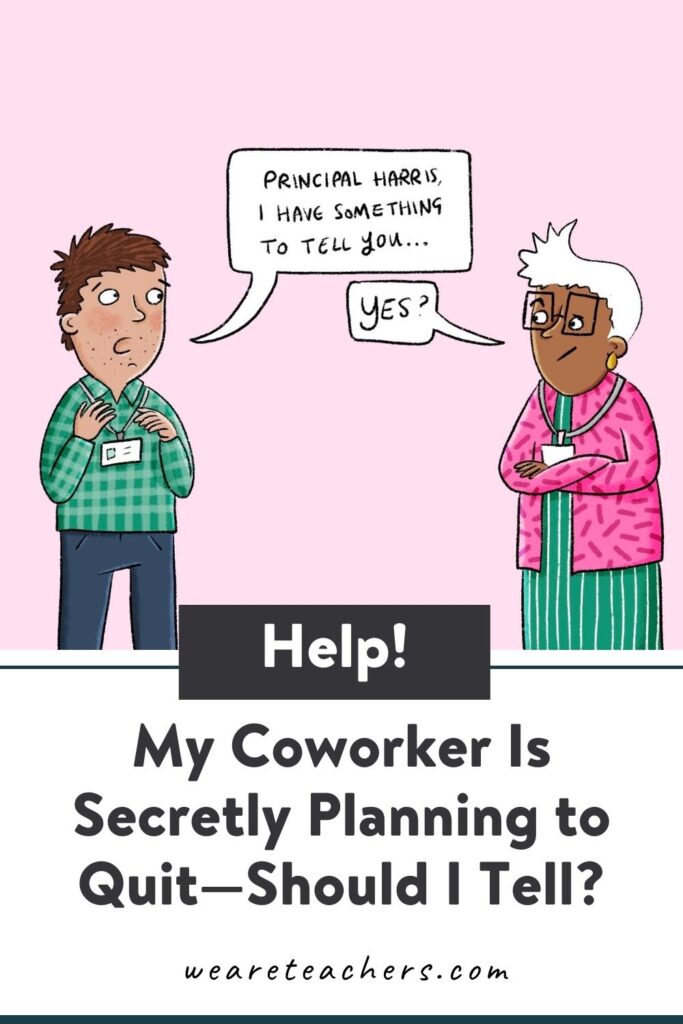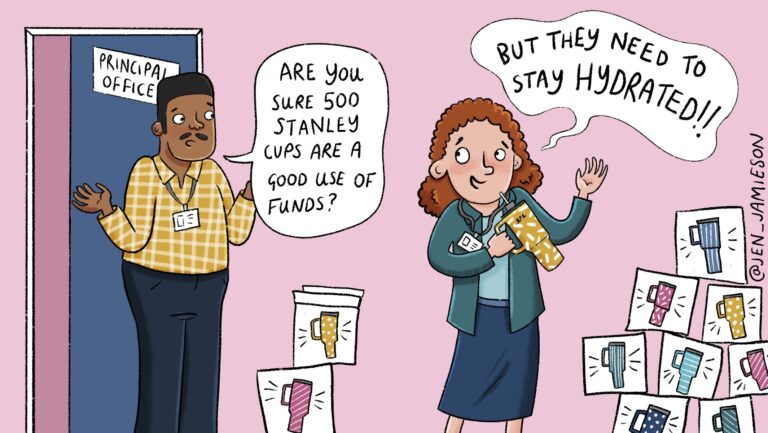Dear WeAreTeachers,
We got a new principal who instantly made waves among faculty (she ended our first faculty meeting with “I don’t care if you like me. If you’re a person who has to like your boss to do your job well, find a new school.”). My co-teacher of 8 years—also a close friend—got a job with a new school, but she has sworn me to secrecy. As a final insult, she wants to resign on July 7, the last day teachers can resign without penalty. I understand her feelings about our principal, but waiting to put our principal in a bind means I might have to work with a “late draft pick” teacher next year. Should I tell my principal anyway and risk my friendship with my co-teacher? —Adding Narc to My Resume
Dear A.N.T.M.R.,
Here’s one side of the coin: We are already in a historic teacher shortage. On top of that, fewer college students are choosing to become teachers than ever before. If your coworker waits until the last minute to resign, you’re right—you could end up having to partner with someone who has been told by many schools before yours, “Yikes. No thanks.” And perhaps with good reason.
Here’s the other side of the coin: There are plenty of reasons why a talented, experienced, fun-to-have-on-your-team teacher might still be looking for a job late in the summer. Sometimes, a late draft pick goes on to win two MVPs, as is the case with future NBA hall-of-famer Nikola Jokić.
*looks around and waits for someone to recognize this superb sports reference*
The best course of action is to have a heart-to-heart with your coworker. Say, “I know you’re angry with our principal. Frankly, I’m angry that she’s making me lose a friend and talented teacher. But I’m worried about who I’ll have to work with next year. Can I be honest for a minute about the impact I’m afraid it’ll have on me?”
Hopefully she’ll realize that the bind she’ll put you in isn’t worth the agony she wants to cause your principal. And if she doesn’t realize that, you can decide whether to risk your friendship by telling your tyrannical principal or cross your fingers for a Jokić-esque late draft pick.
Dear WeAreTeachers,
My contract wasn’t renewed for my current teaching position. On all my applications for jobs starting in the fall, it asks if I’ve ever been terminated from a position. Is this an automatic red flag for employers? Is it a big deal if I just check no on that little box? —Sacked in Hackensack
Dear S.I.H.,
I reached out to an administrator friend on this one. Check out what she had to say.
“It’s definitely more important to be honest. Later down the road, if your principal discovers you didn’t disclose your previous termination, it could make a bad situation much worse.
“I’ve hired many terminated teachers. Most of the time it was newer teachers who were simply laid off due to budget cuts, but occasionally it was more experienced teachers too.
“For me, the reference is everything—even more than the resume. If people who’ve seen their heart, hard work, and teaching abilities can vouch for that candidate, I care a lot less about any of the little checkboxes.
“P.S. My first year as a principal, I had to make a midyear hire. I got an application from someone who was nonrenewed, and found out it was because she told her principal off. When I realized who the principal was, I thought, ‘I’m glad someone did it.’ Ha! I hired her, and she went on to teach for 20 years with us as one of our top educators.”
—Colleen M., 26-year building principal
Dear WeAreTeachers,
The last few weeks, one of my students, Gaby, a high school junior, has been progressively defiant. The pattern is this: He causes a distraction, I redirect him, and he storms out of class. Technically, I can’t write him up for this as my school is only accepting write-ups for violent infractions. What am I supposed to do? —Gaby, Come Back
Dear G.C.B.,
In a perfect world, we would have enough staff to meet your student’s needs. Counselors could help him get to the bottom of his emotions and self-regulation. Family support experts could talk about ways to strengthen the school-home partnership. We would have staff trained in de-escalation and special spaces for students to calm down in a place where they’re safe and supported.
But since we don’t, here’s what you do:
- Create an email contact list with your principal, all other administrators, front office staff, the librarian, and anyone who works near the exits in the school.
- Have an email draft template ready to go that says this: “[Student’s name] has left class without my permission despite instructions to return to his seat. Please keep an eye out for him in the hallway as he is unsupervised.”
- Send this email anytime he leaves class, and then go right back to teaching.
Here’s what this email does:
- Notifies your administration to be on the lookout for your student. It’s not safe for him or others to be unsupervised.
- Documents all the times this student leaves your class. This could be important in getting administrative support for this issue, and for protecting you if something happens to him while out of eyesight.
- Might actually get your administration moving to support you. Parents can FOIA (make a request via the Freedom of Information Act) teacher emails at any time for their student’s name. If an angry parent decided to FOIA emails for their child and something like this popped up, that principal would be fired.
- Annoys your principal. Which it should. Because that discipline policy is goofy.
Do you have a burning question? Email us at askweareteachers@weareteachers.com.
Dear WeAreTeachers,
Up until now at our middle school, when we had a student whose behavior didn’t change despite parent contact (or attempting parent contact), we could contact administration for support. This week, at our faculty meeting, our principal announced a new discipline policy. Next year, we will have to fill out three pages of paperwork and have an in-person meeting with the family on our own before we can even email a principal about a behavior issue. In other words, if a student misbehaves, teachers are given hours of extra work to do before a consequence can be given. Should I talk to my principal about the weakness of this plan, bank on him realizing this himself and changing course, or just jump ship now? —Too Old for This


